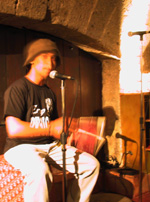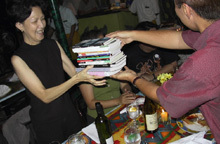|
A FORTNIGHT
ago (15 - 20 Jan, 2001), I visited Manila on a
literary excursion and ran right smack into history in the
making as Joseph Estrada was toppled right before our eyes.
Manila
is the literary capital of South-east
Asia for English writing – second to none. |
Despite
the media excitement about Philippine politics, we were
really going for its rich cultural scene.
To
be honest, we were half-expecting to expound on our sophisticated
Republic's glossy productions to eager, deprived masses.
Instead,
we stumbled on the literary capital of South-east Asia for
English writing - second to none.
We
ended up carting home a tonne of books.
Strike
out Myth No 1: Writers and academics in Manila are not your
limp-wristed, ivory-tower types.
They're
well plugged into the social network - as journalists, speechwriters
and activists.
Many
of their writings draw force from current events, be it
the Estrada debacle or slum dwellers killed by a collapsed
rubbish heap.
During
the anti-Estrada rally, writers like our host, poet Alfred
Yuson, were active on the streets.

Poetry in motion
at Sanctum, one of Manila's hip new lounges
Photo© ALVIN PANG : 19 Jan 2001 |
One
Rofel Brion even tipped us off about the military's behind-the-scenes
manoeuvrings, just minutes before their public defection
at the rally.
Feeding
the vibrant scene are numerous literary circles, awards
and publishers; over three active college-based writers'
centres and programmes; and at least one university literature
faculty with a staff strength of 72 writers - including
resident experts in feminist, South-east Asian and gay writing.
City
newspapers also feature regular literary articles and critical
reviews.
The
upshot of all this activity? A growing pool of young talents
- from diverse backgrounds and both genders - that is astounding
in maturity and quality.
Many
graduate and return to the programmes as mentors, while
holding freelance jobs as writers, teachers or journalists.
Others
move between institutions, or work at US-based universities,
where the Filipino reputation for writing is well established.
This
from a metropolitan city of 12 million, but with less than
half our per capita income.
The
numbers don't account for the sheer talent gap between Singapore
and Manila - and kills the notion that affluence is a necessary
prerequisite of cultural growth.
That
said, big publishers there still sell mass market Tagalog
romances to finance ''serious'' works.
And
people are reading less, like everywhere else in the world.
But
the thriving scene in Manila is anything but esoteric, or
even square.

A faculty member
at the University of the Philippines English Department
receives books from Singapore
Photos © ALVIN PANG : 19 Jan 2001 |
At
Zouk-like hangouts such as the Republic of Malate, young
poets fight for the microphone to sling verses instead of
dance moves, in popular ''poetry slam'' competitions.
Forget
karaoke haikus or pretty poseurs - the writing ranges confidently
from erotic verse to religion and social commentary.
At
the height of the Edsa rally on that Friday night, poetry
lounge Sanctum rocked to well-spun patriotic and political
concoctions recited from memory by passionate 20-something
hipsters.
How
do they do it?
It's
not government funding, although the major writing centres
have well-placed patrons.
Support
mechanisms such as awards, mentorship, writers' centres,
and literary journals help identify and groom talent.
Strange
that cash-rich Singapore seems to have moved away from these
approaches in recent years.
Also
a plus: A culture that favours self-expression and fellowship.
In
Singapore, you'd be hard-pressed to assemble the same line-up
of eager and consummate performers we encountered in Manila.
And
I doubt we could match the sort of generosity and spiritual
fraternity extended to us, fellow writers from abroad.
Writers
in Manila, enviably, need never feel alone in what can be
the loneliest of arts.
Perhaps
their secret is simply that they believe passionately in
country and culture, and in the power of art to change society
and individuals for the better.
And
they act on their convictions with honesty and humility,
without fear or favour.
Passion
can be infectious.
Hosting
a courtesy dinner in our honour, our ambassador to the Philippines
was pulled into a spontaneous joint poetry reading with
our Filipino friends.
This
from straight-laced government officials, who'd spent much
of dinner concerned that Filipinos perceived Singapore as
a nation of maid abusers.
There's
still lots to be learnt. But it's a good thing we've broken
down some stereotypes, and started building bridges.
Following
our visit, 5 writers from Manila made a return visit
to Singapore for Writer's Fest in August 2001.
Writers
in both cities also jointly published LOVE
GATHERS ALL: The Philippines-Singapore
Anthology of Love Poetry (Anvil Books / Ethos Books)
in 2002. |
|